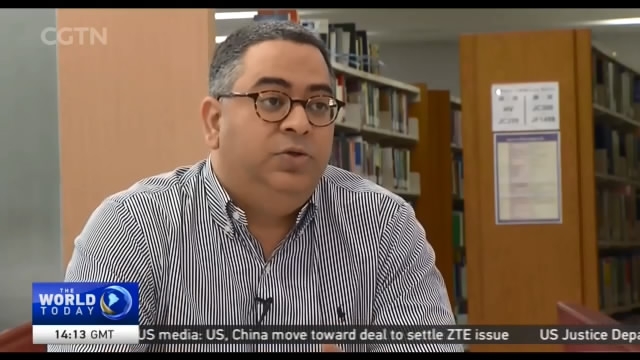
22:25, 22-May-2018
Thailand Junta Protest: Anger mounts as police halt protest on coup anniversary
02:58

Police in Thailand blocked a protest in Bangkok today on the fourth anniversary of the country's most recent coup. Almost all political dissent has been quashed since the military took over in 2014. CGTN's Martin Lowe filed this report from the demonstration.
This is the moment anger spilled over. At the third attempt protesters broke through police barricades. But it was short-lived - an overwhelming number of officers forced them back. This had been the flashpoint. A woman unconscious on the ground; seemingly she'd collapsed. Protesters implored police for help, but they refused to open barriers. It was at least 20 minutes before an ambulance could be brought in by another route.
MARTIN LOWE BANGKOK "This has certainly raised the temperature here. Protesters are angry at the police who they say caused an unnecessary delay in taking the woman to hospital."
The Thai army overthrew an elected government in 2014, saying they'd restore order after political protests and end high-level corruption. Elections were first promised a year later - but they've been repeatedly put back. A date of November 2018 was finally agreed – but that too is now been postponed. The latest date is February 2019. Protesters are demanding an election this year - and an end to military rule.
RANGSIMAN ROME, DEMOCRACY RESTORATION GROUP PROTEST LEADER "If we don't protest how will we get an election. We have no choice because many times we don't do anything but they postpone and postpone and postpone the election, so we have to force them to make it."
Ending violent protests gave the military legitimacy, say some commentators, as did presiding over the death of Thailand's late king in 2016 – but many now believe they should go.
VIROT ALI, ASSOCIATE DEAN OF INTERNATIONAL AFFAIRS THAMMASAT UNIVERSITY, BANGKOK "I think it is quite clear that most of the reforms have not materialized and the economy has been quite bad, especially in the rural sense, so I think that is why a lot of people are saying it's time for the military junta to leave the government and let elections take over."
But the military is already taking steps to retain a measure of control even after elections: they've diluted the power of political parties and will hand-pick who sits in the upper house of parliament. All protest is banned here under military law – and police say action may be taken against the demonstrators.
The Thai prime minister Prayut Chan-o-Cha said later the election is on track but new laws must to be passed and it can't take place earlier than next year. Military authorities said, however, a meeting with a protesters' representative might be possible. Martin Lowe, CGTN, Bangkok.

SITEMAP
Copyright © 2018 CGTN. Beijing ICP prepared NO.16065310-3
Copyright © 2018 CGTN. Beijing ICP prepared NO.16065310-3